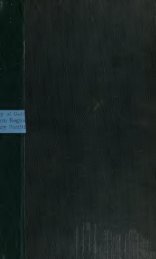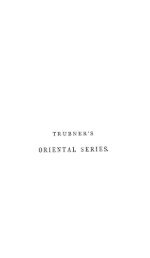Untitled
Untitled
Untitled
Create successful ePaper yourself
Turn your PDF publications into a flip-book with our unique Google optimized e-Paper software.
'<br />
1<br />
g<br />
tf OTE XIV. POETS AND WRITERS IN ANECDOTE XI J,<br />
> . ><br />
A.H. 489 (A.D. 1096). Rtina, from which h,e took his nisba, wa?s a place<br />
near Lahore, not, as^asserted in the Ta'rikh-'i-Guzida, in.Khawa.ran of<br />
Kl/urasan, nor, as the Majma i<br />
uU-Fusahd states, near Nishaptir.<br />
Mas'ud-i-Sa'd-i-Salman. On thjs poet Mjrza Muhammad<br />
wrote a long critical based on a<br />
notice, careful study of his poems,<br />
which I translated into Etfgn'sh^and published in t\\zJ.R.A.S. for 1905<br />
(pp. 693-740) and 1906 (pp. 11-51). The s'ubstance of this, which he<br />
has .summarized in the Persian notes (pp. 142-150 and 178-182) to this<br />
text, is here given in a still more condensed form. The poet's family came<br />
origjnally from Hamadan in Persia, but he himself was born at Lahore,<br />
of which, in several passages in his poems, he speaks as his native place.<br />
Five Kings of the House of Ghazna were the objects of his panegyrics,<br />
to wit Ibrahim,, Mas'tfd III, Shirzad, Arslan and Bahramshah, whose<br />
reigns extended over a period of 96 lunar or 93 solar years (A.H. 451-<br />
547 = A.D. 1059-1152). His special patron was Sultan Ibrahim's son<br />
Mahmud,,who was made governor of India in A.H. 469 (A.D. 1076-7),<br />
an event which the poet asserts to have been foreshadowed fifty years<br />
earlier by the great astronomer al-Biriini in his Tafhim 1 . This is the<br />
earliest date explicitly mentioned by Mas'ud-i-Sa'd. He was probably<br />
born about A.H. 440 (A.D. 1048-9) and died about A.H. 515 (A.D. 1121-2).<br />
In A.H. 480 (A.D. 10878) he shared the suspicion and disgrace into<br />
which his master fell and was imprisoned in different fortresses for ten<br />
years. At the end of this period<br />
i<br />
'<br />
1 17<br />
he was set free at the intercession of<br />
Abu'l-Qasim, one of Sultan Ibrahim's courtiers, and returned to his<br />
father's estate in India. In A.H. 492 (A.D. 1098-9) Sultan Ibrahim died<br />
andwds succeeded by his son Mas'iid III, who conferred the government<br />
of India on his son Shirzad, with whom he sent Qiwamu'1-Mulk Abii<br />
Nasr Hibatu'llah of Pars as commander-in-chief and adviser. This man,<br />
being an old friend of the poet, made him governor of Jalandar, a<br />
dependency of Lahore ; but soon afterwards fell into disfavour in which<br />
his clients were involved, and Mas'tid-i-Sa'd was again imprisoned ki<br />
the fortress of Maranj for another period of eight or nine years. Finally,<br />
about A.H. 500 (A.D. 1106-7), he was released at the intercession of<br />
Thiqatu'1-Mulk Tahir ibn 'AH ibn Mushkan. Being now sixty years of<br />
age and worn out Vjy his long confinements, he retired from public life<br />
and spe.nt the remainder of his days in seclusion. Many contemporary*<br />
poets, such as 'Uthman Mukhtari of Ghazna, Mu'izzi and Sana'i (who<br />
first collected and edited his poetry) bear witness to his pre-eminence<br />
in their a*rt.<br />
Jamalu'd-Dfn Muhammad ibn Nasir al-'Alawi and his brother<br />
Sayyid Hasan ion Nasir of Ghazna were two well-known poets of the<br />
court of Bahramshah, as w&s also Shihabu'd-Din Shah 'All Abu Rija.<br />
See 'Awfi^s Lubdbu'l-Albdb, vol. ii, pp. 267-282.<br />
' There is a faint probability that Ahmad-i-Khalaf may have been<br />
the son^of Khalaf ibn Ahmad, the ruler of Sistan, a probability enhanced<br />
by the fact that the latter bore the kunya of Abii Ahmad, although<br />
there is no other record of the existence of such a son.<br />
><br />
1 See the verses from this interesting poem cited on pp. 144-5 f tne Persian notes,<br />
and note i at the foot of the latter.








![La religione di Zarathustra nella storia religiosa dell' Iran [microform]..](https://img.yumpu.com/15970820/1/151x260/la-religione-di-zarathustra-nella-storia-religiosa-dell-iran-microform.jpg?quality=85)


